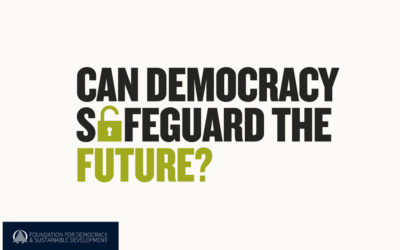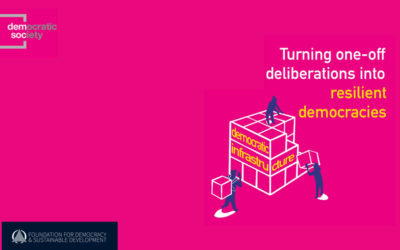Democracy’s value rests on the core principle of political equality: all members of a political community have equal rights to affect decisions made in their name. This simple formula ensures individuals and social groups are treated with dignity and respect and have the necessary autonomy and freedom to flourish.
To be recognized as ‘democratic’, institutions and systems need to realise a number of aspects:
- Inclusiveness: all members of a political community have the right to participate and should have their voices heard.
- Popular control: decisions rest with the political community as a whole.
- Considered judgement: individual and collective decisions should be based on people being adequately informed and understanding the positions of others.
- Transparency: decision-making should be open and accountable.
Other practical elements of a flourishing democracy are generally agreed to be a strong civil society, an active and unrestricted press, a strong and fair legal system, checks and balances on power and free and fair elections. However, democracy is about much more than elections and representative government. More deliberative decision-making and other ways of choosing who is in power, such as by lot, have long been part of democratic political systems.
With the current public unease with politics, there is much debate around rethinking how our democratic systems can and should work. FDSD aims to make sure the interests of future generations and sustainable development are included in that discussion.
Graham Smith, Trustee of FDSD adds:
It challenging to realise in practice the goods of inclusiveness, popular control, considered judgement and transparency. Consider for example the apparently simple question of who should be a member of the political community. We typically use the shorthand ‘citizens’, but this legal status does not include all those affected by decisions: immigrants without citizenship status or those living outside the political territory; those deemed too young or with certain intellectual disabilities; and those who are yet unborn. Decisions of ‘democratic’ states have impacts well beyond their political territories and across time – for example, carbon emissions do not respect borders or generations; and economic policy has effects on producers and consumers beyond national boundaries, impacting on patterns of inequality. How to represent the interests of those not present, but potentially affected, in democratic decision-making is a fundamental task.
Democracy tends to be a form of political organisation that we associate with states – and with representative government in particular. The promise of this form of democracy led to widespread political protest and action across the Middle East in the early part of this century: the Arab Spring. While many of the movements for democratic reform have been crushed, the sheer numbers of people on the streets offers an indication of the desire for democratic rule. Think of the huge queues of people waiting to vote for the first time in emerging democratic societies such as South Africa.
At the same time, democratic societies considered to be more established are facing a crisis of confidence. Trust in politicians and political institutions is at an all-time low; voter turnout and membership of established political parties is generally declining. We seem to have lost confidence in those we have elected to govern: there is a widespread perception they are acting on behalf of sectional interests rather than the political community as a whole. This does not mean a loss of faith in democracy per se (commitment to the democratic ideal remains strong), but rather in its current manifestations.
There is a danger that democracy could become synonymous with representative government: the selection and actions of the elected political class. But democracy means much more than simply voting, more than choosing political parties to rule for the next four to five years. Recall that democracy, when invented in Ancient Greece, had little use for elections: lot and rotation was the central mechanism for the allocation of political power. Representative democracy as we know it is a relatively recent phenomenon.
It should be no surprise, then, that there is much interest and energy in democratic innovation: new ways of invigorating democratic practice through more participatory, deliberative and direct democratic institutions. Such innovations may be bottom-up – through the independent and sometimes confrontational activities and actions of social movements and civil society – or top-down – through the creation of new political institutions that aim to engage individuals and social groups more directly in governing processes.
Equally, it is not necessarily the nation state or local government that is the focus of attention for democratic action. There is a significant democratic deficit at transnational and international levels, particularly in relation to the multi-national economic institutions that govern much of our lives and often exacerbate economic and social inequalities – and hence political inequality. Experiments in democratic governance are taking place outside the formal political realm: economic and social enterprises and new forms of collaborative governance are embracing democratic principles as a way of building legitimacy and confidence amongst their stakeholders and wider communities.
Democracy in an ongoing project. Representative democracy as it exists now is a major achievement, but it is not the end-point of democratic development. If democracy is to thrive in the twenty-first century it will require imagination and practical energy.









